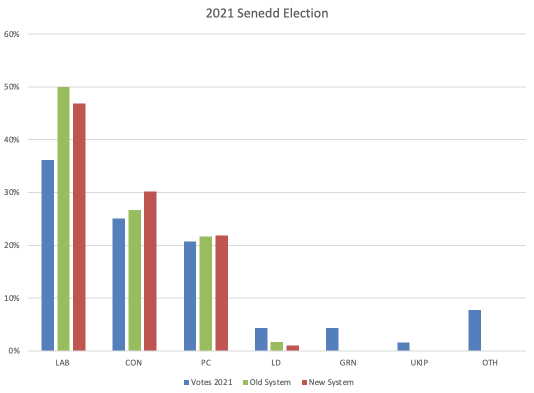A guest blog by Owen Winter, co-founder of Make Votes Matter, on the possible implications of a new system for electing members of the Welsh Senedd.
Yesterday, Mark Drakeford and Adam Price published a "joint position statement" on Senedd reform. The agreement proposed the use of a closed list D'Hondt PR system to elect 96 Members of the Senedd (MSs). The system would have 16 constituencies, each electing 6 MSs. This was criticised by some for its lack of proportionality and "personal" candidate voting. I wanted to take a quick look at how results might shake out under the new system.
Doing so is a little difficult. The new system will be based off pairing up the 32 new Westminster constituencies (proposed by the boundary commission) into 16 Senedd constituencies. We do not know Senedd election results for the new Westminster constituencies, so I have had to design my own 16 constituencies by combining the current boundaries. These are mapped below.
Constituencies used to model the proposed new system
Admittedly, some of these are a bit ugly. I tried to combine pairs of more populated constituencies and triples of less populated constituencies. For example, I've paired Vale of Glamorgan, where 43,000 people voted in 2021, with Cardiff South and Penarth, where 36,000 voted to create one 6 member district with 79,000 votes. At the other end of the spectrum, I've grouped Cynon Valley, where 21,000 people voted, with Merthyr Tydfil and Rhymney (21,000) and Rhondda (23,000) for a 6 member district with . This has necessarily resulted in some malapportionment, which I tried to minimise.
New constituencies under the modelled system but number of votes cast in 2021
Plaid Cymru is probably the biggest loser from this malapportionment, but the effect is not large enough to have a significant effect on the seat projections below.
2021 Senedd election results under the proposed new system
The map above shows the projected winners in each new electoral district, based on 2021's regional list votes. As expected, Labour dominates, with representation in every district. This reflects the fact that Labour had a very successful 2021 election. Almost all districts have an MS from Labour, the Conservatives and Plaid Cymru.
Smaller parties struggle to make it over the 'effective threshold' imposed by 6 member districts. With only 6 members, there is a limit to how representative each constituency can be. In practice, candidates need to win around 10.7% in a 6-seat district to have a good chance of winning one of the seats. Of the smaller parties, only the Liberal Democrats clear this barrier, in the new district created by combing Brecon and Radnorshire with Carmarthenshire East and Dinefwr.
This is surprisingly little change over the 2021 result. The new system would leave Labour with 47% of MSs, fewer than the 50% they actually received. The Conservatives would go from 27% to 30%, Plaid Cymru would stay at around 22% and the sole Liberal Democrat would go from 1 out of 60 (1.7%) to 1 out of 96 (1.0%). It would likely give Plaid Cymru more weight in the administration, while leaving Labour's hold on the First Minister position in tact.
These new results would be marginally more proportional than 2021. Measured using the Gallagher Index, which is a type of average of the difference between seats and votes, the new result would have a score of 10.8 as opposed to 2021's actual score of 11.9 (indicating a smaller difference between votes and seats). For context, the Scottish Parliament typically has Gallagher Index scores between 7 and 8, while Westminster elections can be as high as 15-17.
Interestingly, the new system would have had a bigger effect on the 2016 Senedd election, when more parties won a significant share of the vote. In 2016, the new system would have given the Liberal Democrats, Plaid Cymru and UKIP more MSs, reducing the Gallagher Index from 13.0 to 9.2.
This is undoubtedly a step in the right direction in terms of proportionality. The new system does away with single-member districts, which overrepresent the largest party due to 'overhang seats'. The increase in the total number of MSs (from 60 to 96) also reduces disproportionality, alongside the main benefit of increasing the ability of the Senedd to scrutinise a much more powerful Welsh Government. Increased proportionality and consideration of gender balance are both part of the proposed system and key elements of Make Votes Matter's Good Systems Agreement.
However, the lack of preferential voting (as in STV) or open lists means it is not possible to for voters to express a preference among candidates within a party. The new system also means smaller parties' votes will continue to be wasted, without being transferred to a second-choice party. However, this is somewhat mediated by the increased possibility for smaller parties to target achievable gains. The Greens, for example, would only be 2-3000 votes away from winning a seat in Cardiff Central and North. This is a much more achievable target than winning a larger swing across the whole South Wales Central region, albeit not as favourable as some Greens might have hoped.
I hope that this proposed system is seen as a stepping stone for future reform. Devolved assemblies in the UK are far too small in proportion to the breadth of devolved matters. It would be much easier in future to increase the magnitude of each district to 7, for a 112 seat Senedd, than it has been to agree this shift away from the current system. The larger Senedd will also hopefully result in a diverse new intake of MSs, added to the experience of the current Senedd, who will be better able to represent Wales and may be more favourable towards future reform.
A huge thanks is owed to Electoral Reform Society Cymru for their important work on reforming the Senedd. I know they will continue to push for the best possible Senedd system and for further improvements to Welsh democracy.











